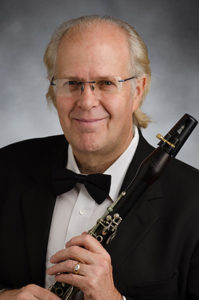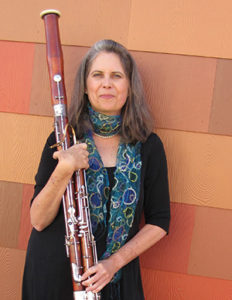• Up Close & Musical • Marin Symphony Orchestra • Honor a Chair

MyungJu Yeo, Principal Flute
Sponsor This Musician
interview by Lily O’Brien
MyungJu Yeo is starting her first season as the principal flutist with the Marin Symphony. After studying flute in her native Korea, at 17 she moved to Vienna and then to Paris to further her music education. She has led an extremely successful performing and teaching career worldwide. Yeo lives in the Bay Area with her husband, a former cellist, who is the executive director for the San Francisco Girls Chorus.
How did you come to play the flute? Did you grow up in a musical family?
No one in my family was a musician. I was the first one to become a serious musician. I started playing piano when I was five, and at 10, I saw my classmate playing the flute and I was totally sold—I thought the sound was so beautiful and lyrical. I told my parents that I wanted to learn the flute, and when my dad went on a business trip to the States, he brought me back a flute, and I started playing.
What kind of music did you hear growing up in Korea?
Mainly classical music, because my mom was super into it, and was always playing it. When I was in middle school I got into hip-hop, and was also interested in Korean traditional music, which is kind of rare. Every Korean kid is required to play some Korean traditional music in school, but the young kids don’t usually get into it. I had some Korean traditional vocal music training, and it was a really fun experience.
What motivated you to audition for the Marin Symphony?
Before we came to the Bay Area, my husband ran the Colorado Music Festival in Boulder, and the Sun Valley Festival where Alasdair has been for over 20 years. I had heard a lot of wonderful things about Alasdair from my husband and from friends, and the fantastic programming he does, so I wanted to work with him. Alasdair is a renowned conductor, and I am very excited and happy that I will be able to work with him, my colleagues, and the audiences here.
When you first came to the United States, what were your impressions of American people?
I moved to Chicago in 2010 from Europe, and the first impression I got was that everyone was so friendly. Strangers in stores would ask me how I was, and I wondered why they were curious about how I was doing. But after a few months I adapted to it, and I thought it was really nice that people were so friendly. And in the Bay Area, people are even more friendly and laid back.
What do you do for fun?
I like to do yoga and I like to go wine tasting. I also like making homemade kimchi. It’s like sauerkraut but it is a bit spicy. You have to put it in salted water for a couple of hours or overnight and you have to chop lots of ingredients and mix it up and make the sauce. It’s a lot of work and preparation—it takes the entire day, but it is very satisfying when you are done.
If your flute could talk, what would it say to you?
Maybe it would shout at me to take it to the repairman, because sometimes I just play and play and play until it is not in good condition.
What kind of music do you like to listen to in your free time?
I listen to soft jazz and some pop music, and this year I discovered Queen’s music after watching Bohemian Rhapsody. I liked it so much, I actually watched it twice. It wasn’t really from my generation, but after watching the movie, I realized I had heard the melodies, so I have been listening to that a lot this year. I can’t listen to classical music without getting serious, but this kind of music is easy for my ears and my brain.
Do you have a favorite composer?
So many, but the German and Austrian composers really speak to me. If I had to pick, it would be Mozart. Studying in Vienna made me really get into Mozart even more. It was really beautiful for musicians—there are concerts every night. It really is the capital of music.
What’s the most unusual experience you have had during a performance?
There was one time in Stuttgart. I was playing Bach’s St John Passion and it was two and a half hours of music without a break. It was beautiful but very intense. After the very last note, some church bells started ringing very far away. It was like somebody was responding to our music. Everyone got really quiet for a few minutes until that sound was gone and people were tearing up. It was really magical.
Why did you choose music as a career?
I just have so much fun playing music in so many different settings, either as a soloist, doing chamber music, or with orchestras. When I was younger, I was doing it more for my own satisfaction and achieving my personal goals. But as I got older, people would tell me how much they loved and enjoyed it, and it started making me think in a totally different way. Since that time, what gives me the most enjoyment is sharing what I have with the audience.
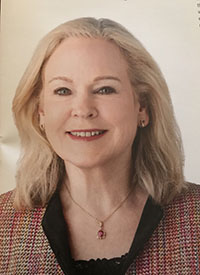
Margot Golding, Principal Oboe
Season Chair Sponsor: William & Lynn Callender
interview by Lily O’Brien
Margot in conversation with Alasdair
Margot in performance
Principal oboist Margot Golding joined the Marin Symphony in 1998. She spent 33 years as a commercial banking executive, while also performing with the Oakland Symphony, the California Symphony and the Fremont Symphony. Not one to slow down, she is currently a member of Echo Chamber Orchestra, and serves on the board of several high-profile, non-profit organizations.
What do you like about playing with Marin Symphony?
It’s always been a very collegial group of people, and Alasdair Neale has taken the level of the orchestra from a strong community orchestra level to a really high professional level. He is just a treasure for us and it’s a joy to play with people who are that good.
How did you come to play the oboe?
When I was in fourth grade, they gave us a list of instruments we could play in the orchestra, and oboe was on that list. I always liked to be a little different, so I started taking private lessons in fifth grade.
What are the challenges of playing oboe?
Oboe in particular has the most persnickety reed of any reed instrument. You spend an extraordinary amount of time on your reeds, because they are what make the sound of the instrument.
How often and how long do you practice?
I practice every day before I have a set, and when I am working on something specific, I’m spending an hour to two hours a day on reeds or practicing. For the Marin Symphony, I probably spend an hour a day for a month beforehand.
What do you enjoy about playing music professionally?
I have always loved the experience of playing in a group. There’s this really experiential thing of being in an orchestra and playing and coordinating with great musicians, while also expressing ourselves individually.
What do you do for fun?
I go on international hiking trips with my girlfriends, and I love to cook, so I’m always doing some kind of food preparation. My specialty is cooking with leftovers, and I try to figure out how to make something new out of them. I am also a fitness buff—I work out with a private trainer three times a week. And I’m enjoying Pickleball!
If you could travel to anyplace in the world, where would it be?
My next sought-after destination is Southeast Asia—Thailand and Vietnam.
What do you think your pet would say about you?
If you’re Margot’s pet, please don’t poop on the living room carpet.
Tell me something about yourself that might surprise people.
I love to go to concerts, ballet and philanthropic events with my friends, but if I don’t have an event, I’m usually watching some kind of addictive thing on Netflix. Right now I’m watching “House of the Dragon”.
What do you think music does for people?
I think that music feeds the soul, brings joy, and makes life more worth living. And that’s important, because we need a respite from the hubbub and all the activities that we have to get done, and experience some kind of deep pleasure or joy that feeds and refreshes us.
Any activities or interests you are passionate about?
I am a big supporter of SHE-CAN, an organization that puts girls from post-conflict countries on full scholarships to U.S. colleges and then sends them back to their countries. They are currently active in Rwanda, Cambodia and Liberia. When you educate and give women leadership capabilities, they can change a country.
What are you most grateful for in your life?
I feel like I am amazingly lucky. I am blessed with so many things—with gifts of ability, and with opportunities. I’ve been able to make wonderful friends, I married a great guy, and I have a wonderful family.
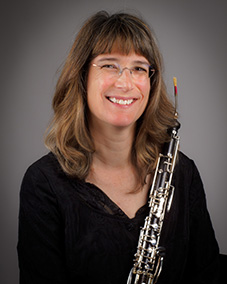
Laura Reynolds, Second Oboe and English Horn
Season Chair Sponsor: Margot Golding & Mike Powers
interview by Jeff vom Saal
How many years have you lived in the bay area: since August 1989.
How long have you been playing with Marin Symphony: since Fall of 1994.
Why, or how, did you choose your instrument: My father, who was a musician and music teacher decided I should play the oboe.
Favorite composer(s): Mahler is my number one classical music favorite, but there are so many others!
What do you like to do outside of music: Hiking (and otherwise appreciating nature), Bird-watching, Ice Skating (just got my own pair of skates!), travel
Arthur Austin, Principal Clarinet
Chair Endowment: The Jack Bissinger & Robert Max Klein Chair
Sponsor This Musician
Arthur in conversation with Alasdair, July 17, 2020
Arthur in performance
Karla Ekholm, Second Bassoon
Season Chair Sponsor: Helen Breck
interview by Jeff vom Saal
How many years have you lived in the bay area? Since I was 15 except for a few years when I was on the East Coast for school and the year I played in Virginia Symphony.
How long have you been playing with Marin Symphony? Since 2000 as a member.
How, did you choose your instrument? Bassoon was chosen for me because I made a perfect score on the listening test and because I have “big hands” (alas not really).
Favorite composers? Mozart, Brahms, Prokofiev
What do you like to do outside of music? Sing opera, watercolor, bike, run and swim.
Funniest memory with Marin Symphony: As a young sub with the orchestra I was called at the last minute to sight read principal bassoon on a concert…except I didn’t own a car at the time. It was really last minute and so the personnel manager – Jeanie Chandler – called a cab to come pick me up in San Francisco and drive me all the way to the Marin Civic Center; I didn’t even have money to pay the cab so Jeanie waited for me to arrive and paid the driver and then rushed me in with moments to spare before the concert started. But wait- that was memorable – but really the funniest moment was during a very soft oboe trio at the opening of a movement in Pictures at an Exhibition when a cymbal decided to go rogue and idly meandered its way from riser to riser making a thorough ruckus before it finally settled down. The funny part was casually glancing over my shoulder to see every one of the percussionists looking straight ahead as if everything was fine and nothing out of the ordinary. Normally that oboe trio can be a touchy entrance, but that night it wasn’t….they could have played as loud as they had wanted and no one would have known.
Most memorable musical experience: Probably my most memorable musical experience was playing contra on Prokofiev 5 at the shed at Tanglewood with Leonard Bernstein conducting. I love the piece, Bernstein’s energy was amazing and I had never played contra in public before – and have only done so a handful of times since – so it was weirdly wonderful yet terrifying.
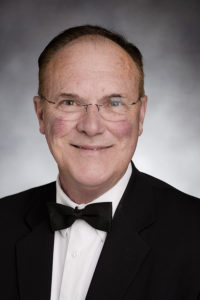
David Granger, Contrabassoon
Sponsor This Musician
interview by Jeff vom Saal
How many years have you lived in the bay area? Since 1997.
How long have you been playing with Marin Symphony? After auditioning many times, I finally got the contra position in 2008.
How did you choose your instrument? My clarinet teacher was actually the principal bassoonist in the Kansas City Philharmonic. When I got old enough, he convinced me to switch to bassoon.
Favorite composers? Besides Bach, Beethoven and Brahms? Mozart, Stravinsky, Benjamin Britten and John Adams.
What do you like to do outside of music? Until the drought, gardening.
If you were not a musician, what would you do instead? First cry, then starve.

